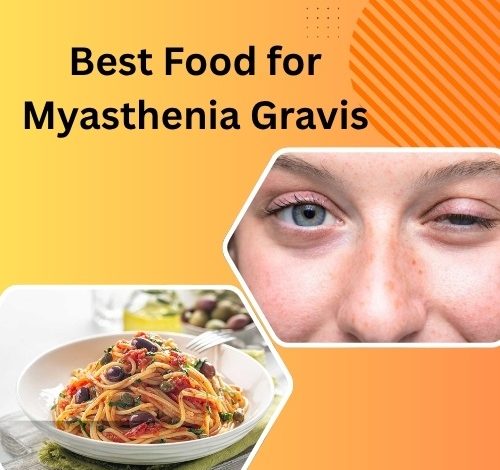Best Food for Myasthenia Gravis: Eat Well to Support Your Strength

Living with Myasthenia Gravis (MG) often means managing fatigue, muscle weakness, and fluctuating energy levels. While medical treatment is crucial, your daily diet plays a significant supporting role in how well you feel and function. The right food choices won’t cure MG, but they can help you manage symptoms more effectively and maintain better overall health. What food is good for Myasthenia Gravis, how certain nutrients affect your condition, and what you might want to avoid. If you’re searching for practical dietary advice that makes a difference, this guide is for you.
Why Nutrition Matters with Myasthenia Gravis
Myasthenia Gravis is an autoimmune disorder that disrupts communication between nerves and muscles, leading to weakness. Eating well can help reduce fatigue, support your immune system, and keep your muscles functioning as effectively as possible.
You don’t need an overly restrictive diet, but you do need to make smart choices. The goal is to give your body the fuel it needs while reducing inflammation and avoiding foods that could interfere with medication or worsen symptoms.
Related Articles: Myasthenia Gravis – Leading To Muscular Weakness
What Food is Good for Myasthenia Gravis?
Let’s look at specific foods that offer real support for people living with MG.
1. Protein-Rich Foods
Protein helps build and maintain muscle mass, which is especially important when dealing with muscle weakness. Choose lean options to support heart health and avoid excess fat intake.
- Recommended options: Chicken, turkey, eggs, tofu, legumes (like lentils and chickpeas), Greek yoghurt, and fish such as salmon or mackerel.
- Tip: Space protein intake throughout the day to maintain energy levels.
2. Fruits and Vegetables
These foods are rich in antioxidants, which support immune health and may reduce inflammation—something that’s often linked to autoimmune flare-ups.
- Best choices: Leafy greens (spinach, kale), berries, oranges, carrots, and broccoli.
- Why they help: Antioxidants like vitamin C, E, and beta-carotene may ease oxidative stress on your muscles.
3. Whole Grains
Complex carbohydrates provide slow-release energy. They help you stay energised without sudden crashes that can worsen fatigue.
- Include: Brown rice, oats, barley, wholemeal bread, and quinoa.
- Benefit: These grains also contain B vitamins, which support nerve function.
4. Healthy Fats
Omega-3 fatty acids have anti-inflammatory effects and can help regulate the immune system.
- Eat more of: Walnuts, flaxseeds, chia seeds, olive oil, and oily fish (like sardines, salmon, or mackerel).
- Avoid: Trans fats and too many saturated fats, which may increase inflammation.
5. Calcium and Vitamin D Sources
Long-term use of corticosteroids (common in MG treatment) can weaken bones. Foods rich in calcium and vitamin D help protect against this.
- Choose: Fortified plant-based milk, dairy products, canned sardines with bones, and mushrooms.
- Consider: Vitamin D supplements if your levels are low, especially during winter months.
6. Iron-Rich Foods
Iron supports oxygen delivery in the body, and low levels can worsen fatigue.
- Eat more of: Red meat in moderation, lentils, spinach, and fortified cereals.
- Pair with: Vitamin C-rich foods to improve absorption (e.g., spinach with lemon juice or lentils with bell peppers).
Foods for Myasthenia Gravis Patients to Avoid
Some foods and habits can interfere with medication or worsen symptoms. Being aware of these helps you stay in control.
1. Highly Processed Foods
Packaged snacks, ready meals, and processed meats contain additives and high levels of sodium and unhealthy fats.
- Why to limit them: They can increase inflammation and contribute to poor energy balance.
- Better swap: Replace with whole foods or homemade meals using fresh ingredients.
2. Alcohol
Alcohol can amplify muscle weakness, affect coordination, and interfere with medications like corticosteroids or immunosuppressants.
- Recommendation: Avoid or strictly limit alcohol intake.
3. Foods High in Saturated Fats
Too much saturated fat can promote inflammation and raise cholesterol, which can increase long-term health risks.
- Limit: Butter, full-fat cheese, cream, and fatty cuts of red meat.
4. High-Fibre Foods Around Medication Time
Cholinesterase inhibitors like pyridostigmine (Mestinon) can be affected by high-fibre meals.
- Tip: Avoid large amounts of fibre (e.g., bran, legumes, raw vegetables) immediately before or after taking these medications.
Sample Day of Eating for Myasthenia Gravis
Here’s a simple, balanced meal plan to get started:
Breakfast:
- Porridge made with oats and almond milk, topped with blueberries and chia seeds
- A boiled egg for protein
Lunch:
- Grilled chicken and quinoa salad with spinach, tomatoes, cucumber, and olive oil
- A piece of fruit like an apple or orange
Snack:
- Greek yoghurt with walnuts and a drizzle of honey
Dinner:
- Baked salmon with roasted sweet potatoes and steamed broccoli
- Side of mixed greens with lemon dressing
Hydration Tip:
Drink water throughout the day, and avoid sugary drinks or caffeine close to bedtime, as these can affect muscle relaxation and sleep.
Swallowing Difficulties? Here’s How to Manage
Many people with MG experience difficulty swallowing (dysphagia). Adjusting food texture and eating habits can help:
- Choose softer foods: Mashed vegetables, soups, smoothies, scrambled eggs.
- Eat smaller, frequent meals: Large meals can be tiring and difficult to manage.
- Sit upright while eating and for at least 30 minutes after.
- Take your time: Chew thoroughly and don’t rush.
If swallowing problems persist, speak to your healthcare provider. They may recommend seeing a speech and language therapist or a dietitian for additional support.
Supplements and Special Considerations
If your diet lacks certain nutrients due to appetite loss or swallowing issues, supplements may be useful—but always check with your doctor first. Some supplements or Natural Remedies For Myasthenia Gravis might interfere with medications for MG.
Also, if you’re curious about how supplements might support your condition beyond diet, you may find our article on what foods help Myasthenia Gravis useful, which includes nutrient-specific guidance and supplement tips.
Related Articles: Home Remedies for Myasthenia Gravis Find the Comfort You Need
Final Thoughts
Making the right food choices can help you feel stronger, more energised, and more in control of Myasthenia Gravis. A diet rich in whole foods—lean proteins, fruits, vegetables, whole grains, and healthy fats—supports muscle function, immune health, and medication effectiveness. Meanwhile, steering clear of processed foods, alcohol, and known dietary triggers can reduce symptom severity and improve overall quality of life.
If you’re looking for deeper insights into food for Myasthenia Gravis patients, or wondering what small adjustments could lead to big improvements, don’t hesitate to seek advice from a registered dietitian familiar with neuromuscular conditions.




